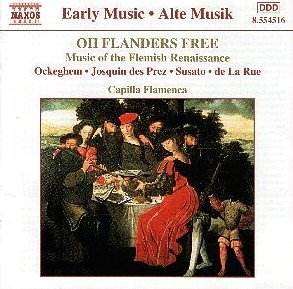OH FLANDERS FREE
Music of the Flemish Renaisaance works by
Fabri / Busnois / da Pesaro / Ockeghem / Rampollini
/ des Prez / Verdelo / de la Rue / Susato
 Capilla Flamenca
Capilla Flamenca
 Recorded 22 -24 September
1996.Irish College, Leuven. Belgium DDD
Recorded 22 -24 September
1996.Irish College, Leuven. Belgium DDD
Naxos 8.554516
[54'57"]
Crotchet
Amazon
UK
Amazon
USA

This is a quick race through musical styles and composers of the dominant
Franco-Flemish music of 15/16 C. There may still be some classical music
enthusiasts who stop short of this period. Most of the items are secular
and many last only a minute or so. They are predominantly vocal, with a few
instrumental interludes, often settings of popular chansons of the time.
The group consists of 5 singers and 4 instrumentalists (recorders and violas
da gamba) from Flanders, and the recording was made in Leuven, 1996. Their
English diction is excellent in Pastime with good company by Henry VIII,
which finds itself included because of links with a French chanson of the
time.
The most substantial pieces are by Ockeghem, one of my particular favourites
[see reviews in S&H and in MotW under Composers from other Countries];
his Ma maitresse for tenor, baritone and bass voices makes a splendid, deep
sonorous sound, and Paul van Loey is very agile on the recorders in pieces
by Fabri. There are humorous songs by Josquin, The cricket and William goes
and warms himself. The programme ends with a mellifluous five-minute realisation
of a song by Pierre de la Rue Mijn hert altijt heeft verlanghen.
The acoustic from the reverberant Chapel of the Irish College is just right,
but it is a bit disconcerting to have total silence between tracks. The
production is very thorough, impressively so for the price, with good notes
to orient the numerous composers, and the 14 page booklet has full texts
with translations. A simple numerical system shows which musicians take part
in each of the 22 tracks.
It is an enjoyable CD which just dips a toe into a vast repertoire. Hopefully,
it will encourage further exploration of this endlessly fascinating genre.
I would suggest going on to Flemish Polyphony (Capella Sancti Michaelis/Currende
Consort - Erik van Nevel) Eufoda 1160-69.
Reviewer
Peter Grahame Woolf

and Harry Downey adds:-
The intention of this disc is to give an indication of the music that could
be heard in Europe in the fifteenth and the first half of the sixteenth centuries
- or to be more precise, music with a Flemish connection. At that time, the
region was the artistic hot-house of Northern Europe. Further south Florence
was a rival but in many ways during this Renaissance period Flanders was
supreme. Based upon commercial prosperity and the peaceful expansion of France
by marriage and treaty, music and musicians flourished.
Musicians came and went in their highly cosmopolitan world. Quite regularly
composers would travel hundreds of miles to a court or patron in another
land. Flemish musicians were among the best of their time and their services
were highly prized. Like present-day footballers they went to the highest
bidder and were to be found in England, Spain, Italy and almost anywhere
else in Europe. Perhaps even further afield if we investigated.
The twenty-two items on this recording then - inevitably they are short pieces
- have a link with the region. Even that prolific writer Anon, it
seems, was Flemish. Surprise, surprise, Henry VIII makes an appearance too,
by way of having employed Flemish musicians at his court and one of his songs
that is included is allegedly based on a French chanson.
Secular music, devotional works, music, love songs, music for a court in
mourning, dances, comedy songs all in an assortment of languages make up
this real mix-n-match selection.
Capilla Flamenca - a group new to me - is made up of four male voices, the
fourth a counter-tenor, and three viola da gambas and recorder player (who
can switch between descant, tenor and treble). All the instruments are copies
of period pieces. The majority of the singing is unaccompanied and the
instrumentalists have relatively minor roles in the recording. The most striking
pieces were those employing the counter - tenor whose line is given the freedom
to soar away freely. The acoustic is a big resonant one and the recording
is exceptionally good throughout - one of the best I have heard for some
time.
Noteworthy in an inevitably 'bitty' programme were, the opening bass solo
in a Gregorian Requiem Aeternam - a fine individual voice which proved
to be so with all the others - and the piece which gave its name to the disc
"Ach Vlaendere vrie" (Oh, Flanders Free ) a 3-part patriotic
song. There was a moment of real knockabout with a treble recorder and drum
and 4 part singing ( 1'03" - subject Bacchus ). A snatch of Josquin des Prez
on "El Grillo" ( "Th e cricket" ) and a song in German for tenor by
Heinrich Isaac "Innsbruck I must leave you" with the simplest of instrumental
forces in a delightful interlude. The Henry VIII song - in absolutely impeccable
English - was Pastime with good company - a pleasant three verse offering.
The programme as it was presented has the order and shape of a live production
and there may well be such a production. On disc I enjoyed it and it deserves
to do well.
Reviewer
Harry Downey

